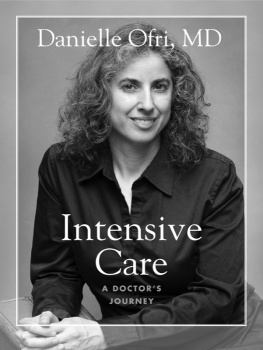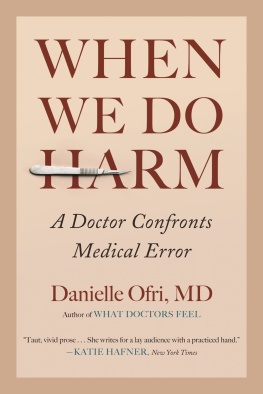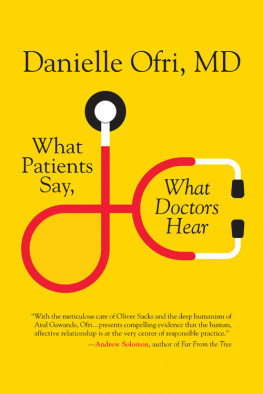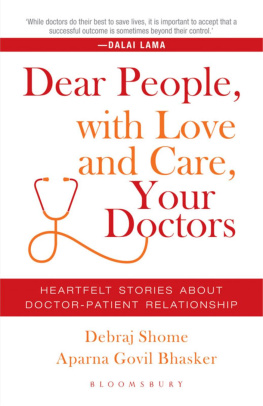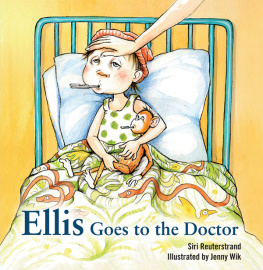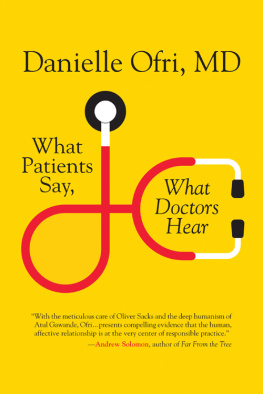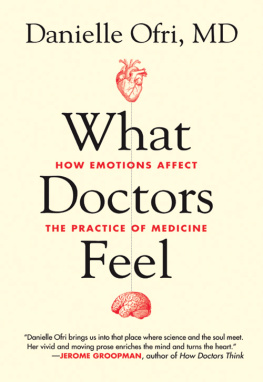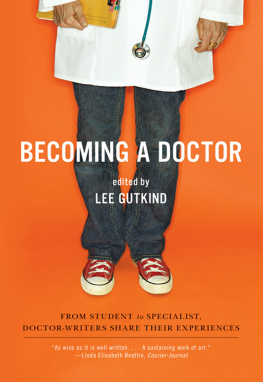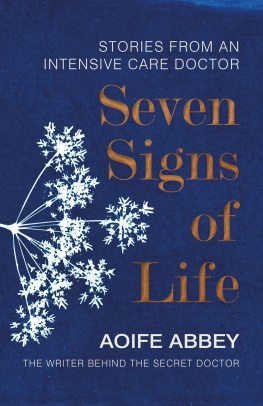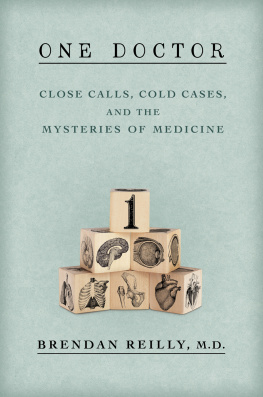
Also by Danielle Ofri:
Singular Intimacies
Incidental Findings
Medicine in Translation
What Doctors Feel (available June 2013)
P OSSESSING H ER W ORDS (PROLOGUE)
A IR F RANCE , she says. No other airline. My body must fly to Paris via Air France.
Air France. I write as quickly as I can.
And they must first go to City Hall to verify the Berneau family name. Her voice warbles through the oxygen mask, direct and dignified, if a bit staccato from her breathlessness.
The anesthesiologist is hovering over Adrienne Berneau with the endotracheal tube and ventilator. Gasping at a rate of thirty-five breaths per minute, with her wispy neck muscles straining like reeds in a summer storm, there isnt much time.
No ceremony before the interment, she continues in her birdlike voice. Just a burial at Rue de la Colonnade. I dutifully transcribe her words as the resident physician silences the insistent alarm on the overhead monitors. The anesthesiologist loads his syringe with succinylcholine.
Adrienne Berneau doesnt look sixty-two years old. She has that mythical, ageless beauty that French women seem to possessher innate charm deceptively triumphant over her Stage IIIB lung cancer.
Please give my paintings to Pierre Montanier, she says, adjusting the headband that holds her reddish-black hair in place. And the linens to my neighbor, Sarah Pelnick... if she would like them.
And you, she says, looking over her oxygen mask at the intern who is drawing yet another tube of blood, it is time for you to start paying me for all that blood Im giving you. The anesthesiologist draws up 10cc of fentanyl. With no way to be unobtrusive in this crowded and cramped room, the medical student shrinks himself further inside his white lab coat.
I read aloud the words I have transcribed and she is satisfied. With delicate, long-nailed fingers from which many an elegant cigarette has dangled, she signs her name in trembling letters. I add mine as the attending physician directly below. The clerk from Accounts Payable stamps her notary in brusque black ink next to our signatures.
She looks directly at me. Seven days, she says, swallowing air in quick bites. Une semaine. Seven days of intubation and treatment is all Adrienne Berneau wants. If I do not get better, she puffs, take it out.
Seven days to figure out whether the spidery latticework that has progressed so rapidly on her chest X-ray is an infection or if it is a suffocating return of her cancer. In seven days we could have a reasonable chance of getting an infection under control. But if the biopsy confirms cancer, the seventh day will likely be her last.
We stand in a silent semicircle around her bed and she glances at each of us. What are you all so nervous about, mes amis? We go forward, non? The anesthesiologist flexes the laryngoscope in the air to check that it is functioning properly and it snaps opens with a decisive metallic click.
I hold her hand and ask if she has any further questions. She shakes her head no. On rounds last week I had distributed an article from a medical journal entitled The Good Death. It talked about how terminally ill patients express a consistent desire to give back to society and so I take a deep breath.
We train young doctors here, I say, nodding to the medical student, resident, and intern gathered around the bedside in their crisp white coats with pockets bulging from medical paraphernalia. Is there anything you would like to share with us that would help us all become better doctors?
She looks around the room, her finely honed cheeks puffing inside the mask. No, I have no complaints. You have all been my guardian angels.
Heavy swallows and four gazes plummet to the ground.
Is there anything else we can get you? I ask, my mouth dry and tentative.
A clean gown, sil vous plat. Ive made a mess of this one. Four sighsa request that we can actually fulfill. The respiratory monitor clangs again to warn of dropping oxygen saturation and four arms rush to silence it.
And you promise me that I sleep through the whole thing? That I do not wake up for the whole week? I nod, hoping that her low blood pressure wont preclude the use of strong sedatives.
The anesthesiologist raises his eyes to the overhead monitor and then looks to me, parallel lines of wrinkles tensing on his forehead. Three loaded syringes are curled in one hand and the plastic endotracheal tube is clasped in the other.
Are you ready? I ask, still holding her hand.
Oui. Her eyes dart over the edge of the mask, locking us in a tight, airless circle.
See you later, I say, in the breezy tone I might use with a friend parting ways on the streetand then silently demand to God that wed better uncover garden variety microorganisms in her lungs and not malignant cells. Well see you at the other end. I add, hoping that I am not lying.
I nod to the anesthesiologist as he discharges the first syringe. Adrienne Berneaus sculpted lips with their carefully applied lipstick soften as the sedative whispers through her veins. Then her fingers suddenly tighten around mine in a viselike grip, her nails digging into my palm. I know that its just the depolarizing effects of the succinylcholine on her muscles, but it feels like a panicked plea for life and I want to shout, No, dont do it. I want to grab the endotracheal tube from the anesthesiologists hand to block what may be the beginning of the end. I want to lay my body across hers and protest the silencing of her words. I want to keep her voice with us in this moment, in this room, in this world.
But I know that it cant hold out. Her flailing respiratory muscles and besotted lungs can no longer support this voice that is so much the embodiment of Adrienne Berneau. It will disappear with or without our mechanical intervention. Seven days on the machine is our only chance.
The anesthesiologist lowers the head of the bed and slides the tube down her throat. Her lipstick is smeared in the process. The machine takes over and all at once Adrienne Berneaus body is limp and sallow like every other body lying in wait in the ICU.
One by one I unlock her tensed fingers from mine. The blunt silence is punctuated only by the heaving of the ventilator. Four pairs of eyes catch each other then shudder away in disparate directions. There is the sudden icy awareness that we might be the possessors of Adrienne Berneaus final words. We might be the guardians of her last smile, her final joke, her ultimate bon mot. We file out from the roommedical student, intern, resident, and attending physicianour hands dangling awkward and useless, our tears threatening to give way. Like an invisible chain, the silent prayer snakes from one to the nextthat maybe Adrienne Berneau will indeed speak again and that we will not be required to carry this burden to our final days.
Seven days we wait.
Seven days we hold her words.
T IME OF D EATH: 3:27 A.M.
The day we die
the wind comes down
to take away
our footprints.
Song of the Southern Bushmen
T HE PATIENT ARRIVED in the ER with a ruptured aorta from a car accident. The doctor jumped onto the stretcher and reached into the wound to grab the hemorrhaging vessel. Seconds later the patient was whisked off to surgery, with the doctor still straddling him upon the stretcher, clamping the aorta with his bare hand.

